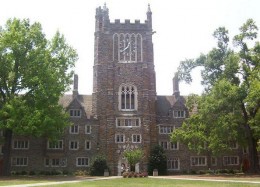Coming Out as Poor at Duke University

When was the first time I felt uncomfortable at Duke because of money? My second day of o-week. My FAC group wanted to meet at Mad Hatter’s Bakery; I went with them and said that I had already eaten on campus because I didn’t have cash to spend. Since then, I have continued to notice the presence of overt and subtle class issues and classism on campus. I couldn’t find a place for my “poor identity.” While writing my resume, I put McDonald’s under work experience. A friend leaned over and said, “Do you think it’s a good idea to put that on your resume?” In their eyes, it was better to list no work experience than to list this “lowly” position. I did not understand these mentalities and perceptions of my peers. Yet no one was talking about this discrepancy, this apparent class stratification that I was seeing all around me.
People associate many things with their identity: I’m a woman, I’m queer, I’m a poet. One of the most defining aspects of my identity is being poor. The amount of money (or lack thereof) in my bank account defines almost every decision I make, in a way that being a woman or being queer never has and never will. Not that these are not important as well, just that in my personal experience, they have been less defining. Money influenced the way I grew up and my family dynamics. It continues to influence the schools I choose to go to, the food I eat, the items I buy and the things I say and do.
KellyNoel Waldorf, a student at Duke, has an editorial in The Duke Chronicle about “coming out as poor” in a college atmosphere where she says talking about class has been difficult for her. And it’s not the kind of “poor student on a ramen diet” that’s prototypical of the “broke college student,” but things like having to lie about reasons why she couldn’t socialize because she felt ashamed about not having money, and having her mother calling her crying, telling her that she doesn’t have enough gas money to pick her up for Thanksgiving.
Waldorf, isn’t alone. As we noted earlier this year, there has been a rise in student groups at colleges all across the U.S. that are trying to foster more discussions about class and socioeconomic diversity on campus. The editorial could be Waldorf’s entree to starting her own.
Photo: Matt Phillips
Support The Billfold
The Billfold continues to exist thanks to support from our readers. Help us continue to do our work by making a monthly pledge on Patreon or a one-time-only contribution through PayPal.
Comments